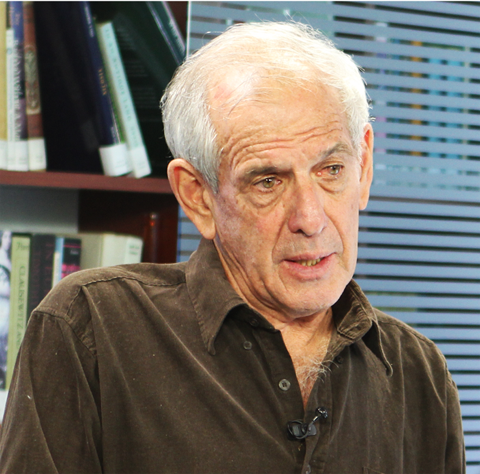Israeli historian, scholar and expert specializing on Holocaust and Genocide, Yair Auron, attended the 12th conference of the International Association of Genocide Scholars in Yerevan. According to him, conducting the event in Yerevan was very important. “It was successful and well-organized. At academic meetings, some things are interesting, and some are not. But the good thing is that you meet old and new colleagues. Besides, genocide studies developed significantly,” Auron said, adding that a conference on the Armenian Genocide is scheduled to be held in November 2015 in Israel, with prominent scholars and young specialist from all over the world participating. Auron is currently working his book on the Armenian Genocide.
ArmenianGenocide100.org presents an interview with the scholar:
What do you think is the most important aspect of holding the 12th conference of the International Association of Genocide Scholars in Yerevan on the centennial of the Armenian Genocide?
I think it is very important to have this meeting in Yerevan. It was successful and well-organized. At academic meeting, some things are interesting, and some are not. But the good thing is that you meet old and new colleagues. Besides, genocide studies developed significantly.
Turkey continues to deny the fact of genocide of Armenians, Greeks and Assyrians in the Ottoman Empire by all means, and the majority of Turkish scholars back this policy. How would you explain and describe the reasons behind such behavior?
Changes can be observed in the Turkish society nowadays. More and more people are open for discussions and encourage the recognition. Even some 5 years ago they could be imprisoned. There was a young scholar from Turkey at the conference, who addressed the issue openly. I asked him about his conditions in Turkey, and he said that nobody insulted him or treated him badly, but he could not find a position of professor anymore. But I do know Turkish professors, studying the issue. Taner Akcam, in particular, is one of my oldest friends and a professor. Leaving Turkey, he lived in Germany for some time, and has now settled in the United States. He speaks about the Genocide openly, and people call on him to go back and do the same in Turkey. However, Akcam was suppressed in Turkey when trying to discuss the Genocide.
I was invited to participate in an academic conference in Turkey in 2008. My Armenian friends advised me not to go there, as they thought Turks would “utilize” me. But I decided to go anyway, and read the synopsis for my account of the Armenian Genocide. I encouraged them to acknowledge the Genocide, although it was a difficult issue to address. They can never be a democratic society, if they don’t face the history. During the question and answer period following the reports, I was given some very nasty questions, even accused of being unaware of the issue I was reporting on. I told them that everything I said, I am confident is true, and called on them face it.
What would you say about the possibility of Israel’s recognition of the Armenian Genocide? What are the reasons behind non-recognition?
If you asked me this question a month ago, my response would be a negative one. Now, I do not think the government will recognize the Genocide, but I do think that the Knesset will. The problem is that the coalition is very limited: they have extremist views concerning Palestine, are against the agreement with Iran.

